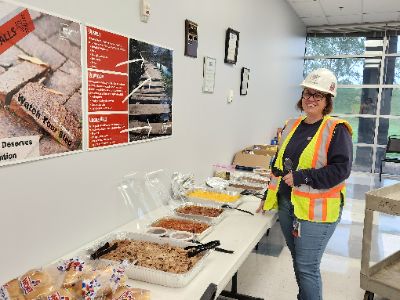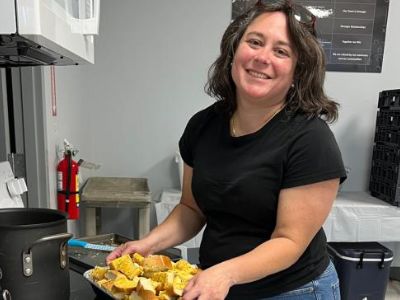After catastrophic storms like Hurricanes Helene and Milton, heroes converge.
 Karen Gilmer, APCo senior key account manager, next to the buffet Czelusniak and her family helped provide to crew members who were working during the storm.
Karen Gilmer, APCo senior key account manager, next to the buffet Czelusniak and her family helped provide to crew members who were working during the storm.
Among them, lineworkers, tree crews, assessors and other utility workers put in long hours, with boots on the ground in perilous conditions, working to restore normalcy in devastated areas.
But not everyone has to know how to install a new pole or restring a transmission line to be someone’s hero.
Whitney Czelusniak is AEP’s economic and business development manager for Virginia. Usually based in Roanoke, she drove to her hometown of Chilhowie, Va., on Friday, Sept. 27, in a lull between the worst of the storm and the flash flooding that came later.
She found her family safe. Communications were down, but they still had power, and any property damage was insignificant.
With her family sorted, she returned to work as soon as cell service returned. With every text, email and call, she asked, “How can I help?” A friend and colleague, Karen Gilmer, a senior key account manager, answered.
Food.
Gilmer found herself filling an unexpected role: helping source three square meals a day for crews
 Whitney Czelusniak, AEP’s economic and business development manager for Virginia, serves crews at the Glade Spring service station during Helene restoration.
Whitney Czelusniak, AEP’s economic and business development manager for Virginia, serves crews at the Glade Spring service station during Helene restoration.
scattered across the county. It’s something she’d never been asked to do before.
“I just took an assignment and hit the ground running with it,” Gilmer said. “My main focus was to make sure that they were not focused on where their next meal was coming from, and they could get out and do the work they needed to do safely.”
She learned Czelusniak’s family lives only a few minutes from the Glade Spring service station, where about 50 personnel from near and far needed to be fed.
“With the flood’s impacts, there weren’t a lot of places that were one, open, or two, able to support the volume of meals we needed,” Czelusniak said. “So, I pitched in the best I could.”
First, Czelusniak secured a generous donation of smoked meat from a local restaurant, Poe's Pulled Pork. After a quick supply run, Czelusniak and her mother rolled up their sleeves and got to cooking sides: pork and beans and mac and cheese.
The next day, the family put three ovens to work, churning out spaghetti, bread and brownies.
“I tried to leave them enough salad to keep eating for a couple of days, too,” she said, chuckling. “I wanted them to have some green veg. They were eating a lot of carbs.”
When she wasn’t cooking, Czelusniak started her day by 6 a.m., helping Gilmer crisscross the county to pick up and deliver boxed lunches.
It made all the difference for at least one employee who traveled from Texas to provide technical support during the restoration effort.
Continuous Improvement Lead Kevin Lozano sent a personal note to local leadership.
“I just wanted to say the ladies cooking home-cooked meals each night for us here is probably the most ‘at home’ feeling I’ve ever had this far away from home on a storm in the 19 years I’ve been here,” Lozano wrote. “I really appreciate it and needed to say something about it. We had homemade dessert, too! I’m about to send this pic to my compadres to rub it in a little.”
His picture showed a spaghetti buffet, well worked over, laid out on folding tables.
Czelusniak said she and her family never wanted any credit. They just wanted to help.
“That one hit my heart,” she said. “That was home. These communities were places I spent a large part of my personal and past professional life. These were neighbors and friends, not just colleagues.”
“This was just a little small thing.”